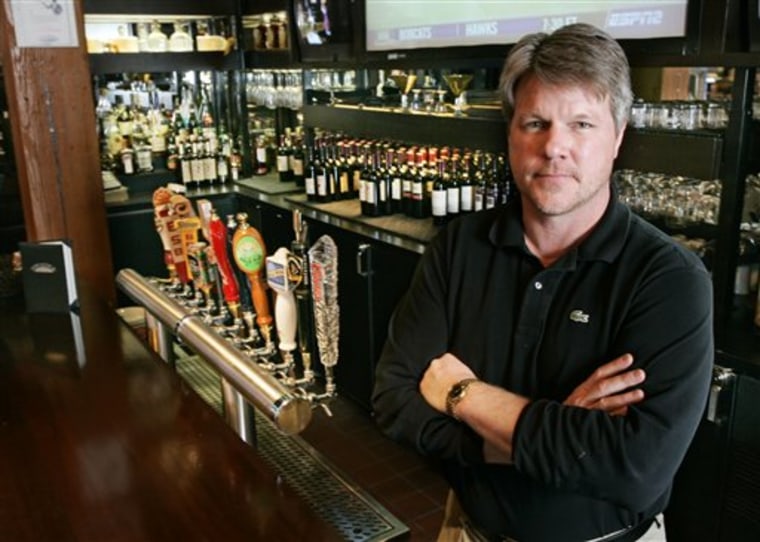It would be hard for Troy Johnston to have a better perch for the 2008 Democratic National Convention. His Brauns Bar and Grill is in the parking lot of the Pepsi Center, where thousands of convention delegates will gather — perfect, he figures, for selling burgers and steaks.
About a half mile away, Jim Harder isn’t sure whether to expect any convention-generated business at his Players Clothing Co., menswear store. “It’s in a time of the year, August, that is one of slowest months anyway,” he says. “I don’t see it being big.”
Denver officials, who went all out to win the four-day convention, hope it will deliver as much as $200 million in economic benefits. But some economists think real world dollars will be much lower.
National political conventions aren’t always the economic boons local officials anticipate, economists said. For one thing, higher security costs in the post-9/11 era detract from bottom-line benefits. Also, increased traffic congestion, protests and other disruptions often lead local residents to avoid businesses near convention sites, offsetting some profits.
As a rule, economists like to take economic predictions by local boosters and move the decimal point one slot to the left. That would put the net value of Denver’s convention closer to $20 million.
“If a city does in fact do well with a political convention, it’s just dumb luck,” said University of Chicago economist Allen Sanderson, who studies large-scale events. “They rolled the dice. It wasn’t careful planning.”
‘Thanks for Nothing!’
Local economic development officials envision hotels and restaurants packed with thousands of delegates, plus more tourists and subsequent business gatherings that they say the exposure of a national political convention will draw long after the delegates go home.
While a convention can raise a host city’s profile and benefit some individuals and businesses, “for the community overall, it’s stressful,” said Robert Baade, an economics professor at Lake Forest College in Chicago who researches the impact of large-scale events. “When you account for the costs as well as the benefits, I think it’s probably an economic wash.”
National political conventions held in Boston and New York City three years ago _ the first since the Sept. 11 terrorist attacks — proved disappointing to many businesses that were expecting crowds of visitors eager to spend money.
In Boston, security measures closed miles of highways, disrupted rail service and included random bag checks on subways. Customers stayed away from many businesses near the convention center, and some stores and restaurants closed or reduced hours of operation.
Halftime Pizza across the street from the FleetCenter, where the convention was held, closed for the week after security fences and other restrictions made the area difficult to access. A sign was posted outside that said, “Say!!!!! D.N.C. Thanks for Nothing!!! Go Bush.”
“Even the businesses that stayed open really didn’t do that much at all,” said the restaurant’s manager, Derick Mains.
‘Unbelievable security measures’
City officials estimated a net gain of $163.3 million in both direct and indirect benefits as a result of the convention. But the Beacon Hill Institute at Suffolk University in Boston, a public policy think tank, calculated a much lower gain — $14.8 million.
The difference stems from a disagreement over costs associated with events that were canceled because of the convention, such as a parade of tall sailing ships.
Similar security measures at the 2004 Republican National Convention in New York City closed streets around Madison Square Garden, the convention site, disappointing dozens of businesses from Broadway shows to restaurants.
“We’re talking about just unbelievable security measures which are very disruptive to the normal functioning of an economy,” said Baade.
New York officials submitted bids for the 2008 Republican and Democratic conventions. But when the decision on the Democratic convention came down to Denver versus New York, Mayor Michael Bloomberg refused to underwrite the event’s cost, citing commitments to other fundraising projects, including $350 million for the World Trade Center memorial.
Bloomberg acknowledged that the diminished economic benefits of conventions were a factor.
In Minneapolis-St. Paul, where the 2008 GOP convention is expected to draw up to 40,000 people in early September, officials estimate the cities will see a $100 million to $150 million benefit.
‘I’m going to do my homework’
Denver host committee president Elbra Wedgeworth, a city councilwoman, said the city’s $200 million estimate is realistic because Boston had more obstacles than Denver, such as heavier retail operations near the convention site.
At the Tattered Cover Book Store, about half a mile from the convention site, owner Joyce Meskis predicted the convention will be profitable for her store and the city.
“We’re in a unique kind of niche, I suppose, as far as some of the candidates will have written books and so we hope they will have an extra minute of time to maybe come by and say howdy do to some of their fans who are interested in purchasing their books,” she said.
As for traffic and security, she recalls the city handled similar challenges during previous gatherings, such as a visit by Pope John Paul II in 1993 and the NBA All-Star Game in 2005.
Some business owners are already making plans to cash in. Johnston says he has received a few inquiries from potential convention customers and is expecting a lot more. His 12,000-square-foot business has a restaurant and a casual sports bar.
“I’m going to do my homework and kind of see what has happened in the past in different cities and kind of get a game plan going,” he said.
